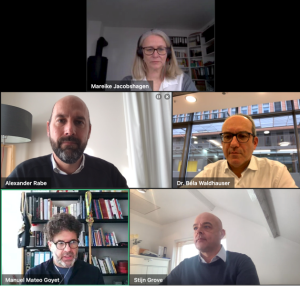Alliance for the Strengthening of Digital Infrastructures in Germany initiates exchange with leading representatives of the EU Commission and the Climate Neutral Data Centre Pact.
Data centres provide an enormous potential for sustainability and can thus make a decisive contribution to achieving the EU’s climate targets. On 22 February, members of the Alliance for the Strengthening of Digital Infrastructures in Germany discussed the associated opportunities and challenges with Manuel Mateo Goyet, Deputy Head of Unit – Cloud and Software at the European Commission and Stijn Grove, Board Member of the Climate Neutral Data Centre Pact.
Data centres as part of the solution to reduce CO2
“We are currently dealing with several topics: In the future, data centres must not only be considered as energy consumers, but also as an important factor in stabilising the power grids.” This statement provided at the event by Goyet reflected the EU Commission’s perspective. “The Energy Efficiency Directive (EED) contains a reference to data centres for the first time in this regard. We believe that transparency and reporting are essential factors.”
According to Dr Béla Waldhauser, Spokesperson for the eco Alliance for the Strengthening of Digital Infrastructures in Germany, the data centre industry sees itself as part of the solution to a rapid and sustainable reduction of CO2 emissions. “Today’s data centres are already significantly more efficient than they were five years ago. For example, significant advances in virtualisation have more than compensated for the increase in energy consumption in relation to computing power in recent years.”
eco Alliance supports the Climate Neutral Data Centre Pact
With the Climate Neutral Data Centre Pact – which has also been signed by the Alliance for the Strengthening of Digital Infrastructures in Germany, founded under the umbrella of the eco Association – the European data centre industry is pursuing an ambitious goal: within the framework of the voluntary declaration, existing data centres are to be operated in a climate-neutral manner by 2030. These include, among other things, compliance with power and water usage effectiveness (PUE and WUE), proof of renewable energy sourcing, and the integration of IT components into a circular economy.
“We launched the Climate Neutral Data Centre Pact to show the world how important, but also how sustainable, data centres are, what the industry is currently doing, what it can improve in the future,” said Stijn Grove, Board Member of the international project. “One of our goals is to improve the framework for waste heat utilisation. Data centres need to be more active in integrating into smart energy grids in the future. Here, we still see plenty of space for research and development.”
In the joint panel, Dr. Waldhauser emphasised that the three parameters of energy efficiency, sustainability and climate neutrality should always be considered collectively: “Despite the best energy efficiency values, climate neutrality cannot be achieved by purchasing grey electricity from fossil-fuel power plants.” A key prerequisite for data centre operators in Germany is therefore to have sufficient access to green energy.
Digital sovereignty as a success factor for Europe
A further topic is the importance of digital sovereignty, which has become a relevant success factor for Germany and Europe. The participants all shared the opinion that data centres are of high value, given that they form the bedrock of our industry and thus act not least as an accelerator for the digitalisation of SMEs.
Here you can access the recording of the panel discussion from 22 February 2022.




